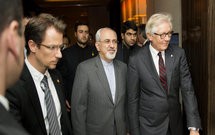 A historic agreement following touch-and-go negotiations on Iran's nuclear program was reached in Geneva on Nov. 23 between Tehran and the P-5+1 (the permanent members of the U.N. Security Council plus Germany). The agreement is not a final settlement of all outstanding issues, but it is regarded as a first step.
A historic agreement following touch-and-go negotiations on Iran's nuclear program was reached in Geneva on Nov. 23 between Tehran and the P-5+1 (the permanent members of the U.N. Security Council plus Germany). The agreement is not a final settlement of all outstanding issues, but it is regarded as a first step.
Details are still coming in on the deal, but so far it has been reported to include the following: Iran will stop enriching uranium past 5 percent, and all 20-percent enriched uranium will be diluted or converted to the point where it could not easily be used to make weapons-grade uranium. No additional centrifuges will be installed by Iran. The Natanz and Fordow nuclear facilities will remain operational, but they will be visited by international monitors. For its part, the United States has promised up to $7 billion in sanctions relief, all of which could be enacted by the executive branch without approval by the U.S. Congress.
The important question at this point is whether there has been discussion of a final agreement and some broad understandings as to where this is heading, or whether the discussions have focused only on the first step. It is difficult to imagine that the various parties would have been willing to take a first step without have some sense of whether a comprehensive agreement is possible and what it might look like.
The core issue has been Iran's nuclear program. This has been seen by the United States and Israel, among other countries, as an unacceptable threat. The response was a regime of economic sanctions limiting Iran's ability to trade and freezing Iranian assets. Any final deal would require the dismantling of Iran's nuclear program under international monitoring and ending all sanctions against Iran.
There is another dimension in the relationship. Iran needs Western investment in order to modernize its economy and develop its energy industry. There are many companies in the West eager to have the opportunity to invest and do business with the Iranian regime. We would assume that these would logically follow from any final agreement.
There are other issues between the two sides that would likely not be addressed in any final settlement but would somehow require discussion. The most important is political. Iran supports Hezbollah in Lebanon, the al Assad regime in Syria and other Shiite groups in the Arabian Peninsula. The United States in particular would likely want Iran to abandon or at least reshape its relations with these groups.
Iran would also want the United States to remove support for anti-Iranian organizations operating out of Iraq and elsewhere, as well as to make guarantees that it would abandon attempts at regime change in Tehran. Most important, the Iranians want to be certain that a regime hostile to them does not arise in Iraq. Iraq represents a historical threat to Iran, and maintaining either a pro-Iranian or at least rigorously neutral regime there would be of extreme importance to Tehran.
This latter set of issues would not be included in any formal agreement. Neither side would want to make public these political deals. But the side agreements on political relations are critical to both. The United States does not want, for example, the Iranians to destabilize the Arabian Peninsula. The Iranians do not want the Saudis and Americans supporting anti-Iranian Sunnis in Iraq.
It is not clear that any agreement with Iran will go this far. It is likely, however, that there have been some informal discussions over the shape of a final settlement to make all sides comfortable that the first step is not the last. It is also likely that informal channels have discussed some of the political issues.
Obviously, the Saudis and Israelis are uncomfortable with this evolution. It is interesting that neither the Saudis nor the Israelis wanted this first step or a final agreement on weapons and sanctions. However, if that settlement is reached they will likely want political guarantees that will make them insistent on side agreements.
Courtesy : Stratfor (www.stratfor.com)